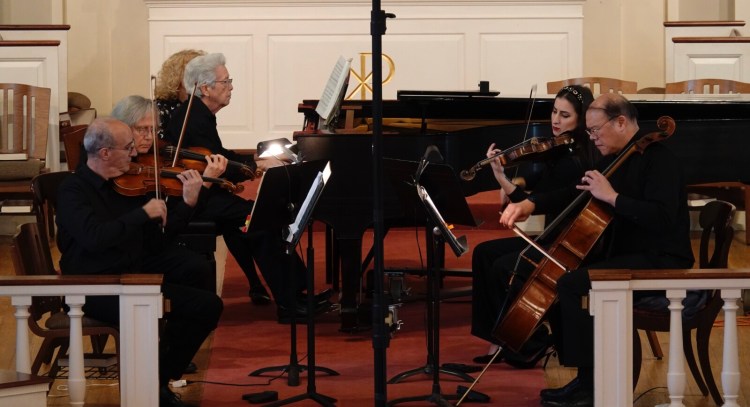On Sunday’s sunny afternoon, the Portland String Quartet (PSQ) offered a concert equally challenging and thought-provoking at Woodfords Congregational Church in Portland.
A pair of gritty modernist works had PSQ regulars Dean Stein (first violin), Ronald Lantz (second violin) and Andrew Mark (cello), plus guests Brianna Fischler (viola) and Paul Posnak (piano), pushing through long stretches of difficult music to reach hard-won moments of fleeting beauty.
According to most accounts, Dmitri Shostakovich was often menaced by Soviet authorities for composing complex music that somehow, they feared, challenged their authority. More than a few westerners have also had problems with the anxiety-inducing aspects of his music, regardless of what it might have had to say about any particular regime.
When sorting through the bitterness and irony evinced in Shostakovich’s work, very appealing nuggets of lyricism are found. The well-prepared PSQ was more than able to highlight both the raw and refined ingredients within his “String Quartet No. 3” (1946), often understood as a post-WWII summation from the protean composer.
At times the low and high strings of the PSQ seemed to chase each other across the up-tempo movements while at other times duo passages stood apart. An animated Fischler and a forthright Mark engaged in a deep conversation that was countered by an exquisitely lyrical passage from Stein during the somber fourth movement.
What to make of Shostakovich is a question that has both drawn audiences to his music and turned them away. This PSQ performance presented a worthy iteration of many of the avenues that have inspired reactions over the years. His complex music very much lives on.
Having already tested their musical stamina, the PSQ still charged back after intermission with Swiss-born American composer Ernest Bloch’s Piano Quintet #1 (1923), yet another hard-hitting work.
As introduced by pianist Posnak (through an unfortunately booming public address system), the Bloch quintet is another post-war statement of sorts, this one from after WWI.
Taking his place at the piano situated behind the quartet, Posnak added forcefully to the work’s moody, dramatic passages, elevating the performance to sonic levels that enveloped the masked crowd seated throughout the spacious but acoustically friendly church hall.
The Bloch piece, coming more than 20 years (and another war) before the Shostakovich quartet, constituted a more straightforward, visceral reaction to adversity than that by the elusive Russian master. Heavy handedness came to mind but also a fulsome sense of the majesty of impassioned music. The bravura performance by the PSQ and guests was just short of overpowering.
The afternoon had begun gently enough with British-American composer Rebecca Clarke’s “Adagio” (1926), a brief, flowing work with a probing, noirish bent, all wrapped in impressionistic harmonies. This affecting piece would become the only work in the program that seemed over too soon.
Steve Feeney is a freelance writer who lives in Portland.
Copy the Story LinkSend questions/comments to the editors.



Success. Please wait for the page to reload. If the page does not reload within 5 seconds, please refresh the page.
Enter your email and password to access comments.
Hi, to comment on stories you must . This profile is in addition to your subscription and website login.
Already have a commenting profile? .
Invalid username/password.
Please check your email to confirm and complete your registration.
Only subscribers are eligible to post comments. Please subscribe or login first for digital access. Here’s why.
Use the form below to reset your password. When you've submitted your account email, we will send an email with a reset code.